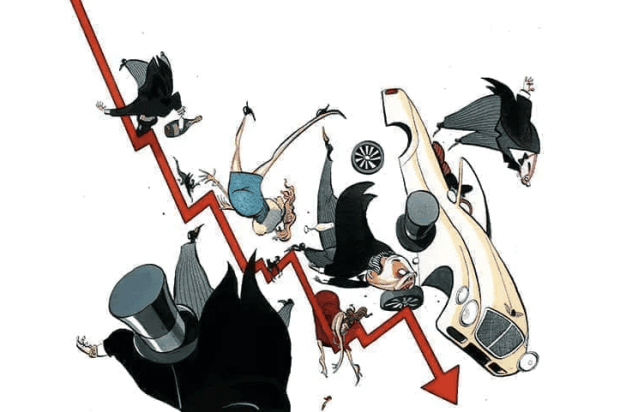A theme of this autumn has been conversations about corporate reputation and how it is guarded or lost. To name but three, I have kicked this around at a ‘Trust Forum’ sponsored by the lawyers DLA Piper at Oxford’s Said Business School, at a lunch hosted by the wealth managers McInroy & Wood, and in an interview with Lord (Stuart) Rose, former Marks & Spencer chief, at last week’s York Business Conference. The essence is that most big companies feel their reputations are increasingly fragile, and that public trust is now routinely and unfairly denied to them.
Non-banks blame banks for letting the side down. All companies blame the media for failing to report good news, and social media for spreading false or subversive rumours. The media blames PR for hiding the truth and the boardroom fraternity for failing to see themselves as others see them. The left blames executives for paying themselves too much; the right blames government for regulating as though business always behave badly if left to itself.
One frequently asked question is ‘Why doesn’t anyone give us credit for all the CSR (corporate social responsibility) stuff we do these days?’ To which my answer is that CSR is more likely to look authentic and attract brownie points if it contains elements of enlightened self-interest. Thus ‘support for literacy and IT training in schools close to the factories from which we draw our apprentices’ is a progressive use of resources; ‘support for local community projects chosen by our staff’ is good for motivation and teamwork. But wider social programmes funded by companies that are otherwise known for cheating customers, bullying suppliers, screwing workers and enriching bosses? That looks like, and probably is, cynical window-dressing.
The answer to conserving reputation and trust — and thereby enhancing shareholder value, which is of course the ultimate objective of corporate life — is really a simple one: get the basics right. Sell safe products that do what they say on the tin. Respect customers, staff and suppliers. Be a responsible citizen. Minimise tax bills within the law, but pay some tax wherever you operate. Reward individual contributions to success, but don’t throw fortunes at mediocre executives. And keep a team of smart people standing by to respond to Twitter storms when accidents happen. Readers are invited to submit examples of companies that do all this today, to martin@spectator.co.uk.
The tattooed man
Anyone care to nominate Co-op Bank? Surely the year’s worst attempt to rebuild a damaged reputation was its ‘tattooed man’ advert, launched last month. In case you missed this gem (which may have been withdrawn by now), it features a topless man declaring that he belongs ‘to an organisation that believes in doing things differently’ — a new gay dating app was my first guess — while having ‘Ethics & Values’ tattooed on his shoulder. Then he declares: ‘For over 20 years, we’ve refused to lend more than £1 billion to organisations that don’t meet our ethical standards’, prompting grammarians to howl: ‘So you agree to lend to arms dealers as long as they borrow less than a billion?’ If I was a Co-op Bank customer, I would have moved my account months ago and I wouldn’t be coming back. If I was one of its new hedge-fund shareholders, I’d fire everyone responsible for this campaign, said to have cost £5 million, having first tattooed ‘Loser’ on their buttocks.
Quixotic defeat
Last week’s other loser in the financial arena was George Osborne, who admitted defeat in his Quixotic tilt at Brussels over the EU bonus cap. After Niilo Jääskinen, advocate general of the European Court of Justice, dismissed every point in the latest British submission against the cap, Osborne announced he was not going to spend taxpayers’ money on a further appeal that was ‘unlikely to succeed’. He may also have figured out that spending taxpayers’ money on a campaign in which he appears to be the bankers’ best friend offered slim returns in the run-up to the election, especially since his banker friends are so smart at devising ways to circumvent attempts to rein in their pay anyway, through ‘role-based allowances’ or whatever they come up with next. But let’s remember that the Chancellor wasn’t wrong about the cap, and that the Bank of England agreed with him: for reasons argued here last month, Brussels has actually succeeded in making banking riskier.
Welcome to Heathrow
Airports offer another reputational case in point. Weekend papers carried double-page ads for the independent Heathrow Hub proposal to extend the existing northern runway westwards over the M25, instead of building a new third runway or expanding Gatwick. The ads were no doubt aimed at what marketing folk call ‘C-Suite’ readers, who also happen to be business-class frequent flyers. The trouble is, travellers in this category have a primarily selfish concern in relation to airports, which is that they prefer to pass through them as painlessly as possible, and in that respect Heathrow is a world-class nightmare. Any proposal to expand it will win far more influential support by promising to bring the premium passenger experience into the 21st century than by claiming to minimise noise pollution for west London residents.
A fair ranking of my own recent experience of major UK airports would be Manchester (inbound) nine out of ten, Gatwick (outbound) eight, Heathrow (inbound) four. Touching down 45 minutes early on an overnight flight from the US, we lost that time advantage thanks to a late change of gate, a hiccup with the air-bridge and a long delay before the luggage reached the carousel. ‘Welcome to Heathrow,’ I heard one American mutter to another as they filled the wait by swapping horror stories of previous arrivals. As I say, just get the basics right.
Got something to add? Join the discussion and comment below.
Get 10 issues for just $10
Subscribe to The Spectator Australia today for the next 10 magazine issues, plus full online access, for just $10.
You might disagree with half of it, but you’ll enjoy reading all of it. Try your first month for free, then just $2 a week for the remainder of your first year.














Comments
Don't miss out
Join the conversation with other Spectator Australia readers. Subscribe to leave a comment.
SUBSCRIBEAlready a subscriber? Log in